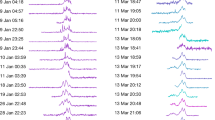Abstract
Högbom and Shakeshaft1 have recently presented evidence for a secular variation of the intensity of radio emission from the source Cassiopeia A. Their observations, made at a frequency of 81.5 Mc./s. over a period of 12 years, suggest that the flux density of Cassiopeia A relative to that of Cygnus A is decreasing at a rate of about 1 per cent per annum. This type of measurement may be sensitive to unknown systematic instrumental effects, and the importance of the result makes independent confirmation desirable.
This is a preview of subscription content, access via your institution
Access options
Subscribe to this journal
Receive 51 print issues and online access
$199.00 per year
only $3.90 per issue
Buy this article
- Purchase on Springer Link
- Instant access to full article PDF
Prices may be subject to local taxes which are calculated during checkout
Similar content being viewed by others
References
Högbom, J. A., and Shakeshaft, J. R., Nature, 189, 561 (1961).
Westerhout, G., B.A.N., 14, 215 (1958).
Mezger, P. G., Z. Astrophys., 46, 234 (1958).
Heeschen, D. S., Astrophys. J. (in the press).
Hagen, J. P., McClain, E. F., and Hepburn, N., Proc. Inst. Rad. Eng., 42, 1811 (1954).
Author information
Authors and Affiliations
Rights and permissions
About this article
Cite this article
HEESCHEN, D., MEREDITH, B. Secular Variation of the Flux Density of the Radio Source Cassiopeia A. Nature 190, 705–706 (1961). https://doi.org/10.1038/190705a0
Issue Date:
DOI: https://doi.org/10.1038/190705a0
This article is cited by
-
On the stability of the radiation from the discrete radio source Cassiopeia-A in the decameter range of wavelengths
Radiophysics and Quantum Electronics (1970)
-
Decrease of Flux Density of the Radio Source Cassiopeia A at 81.5 MHz
Nature (1969)
-
Absolute measurements of the intensity of the radio emission of the discrete sources Cassiopeia-A and Cygnus-A at wavelengths of 30?60 cm
Radiophysics and Quantum Electronics (1969)
-
Frequency dependence and variation with time of the flux density ratio of the discrete sources Cassiopeia A and Cygnus A at decameter wavelengths
Soviet Radiophysics (1966)
Comments
By submitting a comment you agree to abide by our Terms and Community Guidelines. If you find something abusive or that does not comply with our terms or guidelines please flag it as inappropriate.



